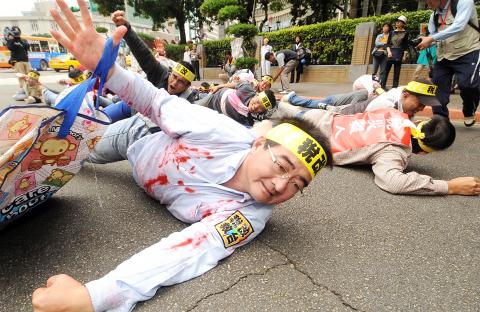An initiative to refer the controversial Economic Cooperation Framework Agreement (ECFA) to a plebiscite has received enough signatures for submission to the Referendum Review Committee once again, organizers said.
Following two failed attempts earlier this year, the Taiwan Solidarity Union (TSU) announced yesterday it had gathered another 100,000 petition signatures, more than the number needed to be considered for placement on a future ballot.
“This initiative is reflective of the level of determination Taiwanese have to repeal the ECFA,” TSU Chairman Huang Kun-huei (黃昆輝) said, leading party members in submitting the boxes of signatures to the Central Election Commission.

PHOTO: GEORGE TSORNG, TAIPEI TIMES
“Although the ECFA has already come into force, we still want to remind the public that the agreement’s negative effects will soon become increasingly apparent,” he said. “Very soon, everybody will be feeling the impact.”
The measure, which must be approved by the Central Election Commission and the referendum committee before it can proceed to the second stage of the referendum process, will put the entire agreement to a legally binding public vote.
The committee, which is responsible for screening referendum measures, earlier this year rejected two related proposals that were spearheaded by the TSU, citing a contradiction between the referendum question and content of the proposal. An earlier proposal raised by the DPP was also rejected last year.
The TSU claims that efforts to block the referendums were “unfair and undemocratic,” citing the Referendum Act (公投法), a position the government has dismissed.
Critics have said that the poll is necessary because the ECFA, which reduces cross-strait tariffs for select goods and services, will result in a harmful influx of cheaper Chinese goods. This could depress middle-class salaries and cost jobs, they said, especially among more traditional industries.
In April, a poll by the Liberty Times (the Taipei Times’ sister newspaper) found that 36 percent of Taiwanese surveyed said they opposed the agreement compared with 28 who supported it.

Alain Robert, known as the "French Spider-Man," praised Alex Honnold as exceptionally well-prepared after the US climber completed a free solo ascent of Taipei 101 yesterday. Robert said Honnold's ascent of the 508m-tall skyscraper in just more than one-and-a-half hours without using safety ropes or equipment was a remarkable achievement. "This is my life," he said in an interview conducted in French, adding that he liked the feeling of being "on the edge of danger." The 63-year-old Frenchman climbed Taipei 101 using ropes in December 2004, taking about four hours to reach the top. On a one-to-10 scale of difficulty, Robert said Taipei 101

A preclearance service to facilitate entry for people traveling to select airports in Japan would be available from Thursday next week to Feb. 25 at Taiwan Taoyuan International Airport, Taoyuan International Airport Corp (TIAC) said on Tuesday. The service was first made available to Taiwanese travelers throughout the winter vacation of 2024 and during the Lunar New Year holiday. In addition to flights to the Japanese cities of Hakodate, Asahikawa, Akita, Sendai, Niigata, Okayama, Takamatsu, Kumamoto and Kagoshima, the service would be available to travelers to Kobe and Oita. The service can be accessed by passengers of 15 flight routes operated by

Taiwanese and US defense groups are collaborating to introduce deployable, semi-autonomous manufacturing systems for drones and components in a boost to the nation’s supply chain resilience. Taiwan’s G-Tech Optroelectronics Corp subsidiary GTOC and the US’ Aerkomm Inc on Friday announced an agreement with fellow US-based Firestorm Lab to adopt the latter’s xCell, a technology featuring 3D printers fitted in 6.1m container units. The systems enable aerial platforms and parts to be produced in high volumes from dispersed nodes capable of rapid redeployment, to minimize the risk of enemy strikes and to meet field requirements, they said. Firestorm chief technology officer Ian Muceus said

MORE FALL: An investigation into one of Xi’s key cronies, part of a broader ‘anti-corruption’ drive, indicates that he might have a deep distrust in the military, an expert said China’s latest military purge underscores systemic risks in its shift from collective leadership to sole rule under Chinese President Xi Jinping (習近平), and could disrupt its chain of command and military capabilities, a national security official said yesterday. If decisionmaking within the Chinese Communist Party has become “irrational” under one-man rule, the Taiwan Strait and the regional situation must be approached with extreme caution, given unforeseen risks, they added. The anonymous official made the remarks as China’s Central Military Commission Vice Chairman Zhang Youxia (張又俠) and Joint Staff Department Chief of Staff Liu Zhenli (劉振立) were reportedly being investigated for suspected “serious